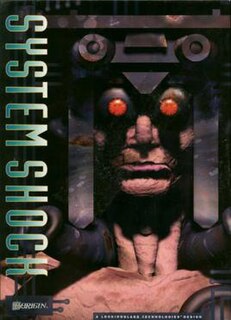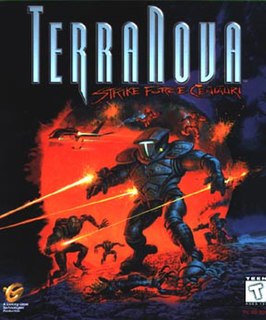Related Research Articles

System Shock is a 1994 first-person action-adventure video game developed by LookingGlass Technologies and published by Origin Systems. It was directed by Doug Church with Warren Spector serving as producer. The game is set aboard a space station in a cyberpunk vision of the year 2072. Assuming the role of a nameless hacker, the player attempts to hinder the plans of a malevolent artificial intelligence called SHODAN.

Catacomb 3-D is the third in the Catacomb series of video games, and the first of these games to feature 3D computer graphics. The game was originally published by Softdisk under the Gamer's Edge label, and is a first-person shooter with a dark fantasy setting. The player takes control of the high wizard Petton Everhail, descending into the catacombs of the Towne Cemetery to defeat the evil lich Nemesis and rescue his friend Grelminar.

Looking Glass Studios, Inc. was an American video game developer based in Cambridge, Massachusetts. The company was founded by Paul Neurath with Ned Lerner as Blue Sky Productions in 1990, and merged with Lerner's Lerner Research in 1992 to become LookingGlass Technologies. Between 1997 and 1999, the company was part of AverStar, where it was renamed Looking Glass Studios. Following financial issues at Looking Glass, the studio shut down in May 2000. Notable productions by Looking Glass include the Ultima Underworld, System Shock and Thief series.

Origin Systems was an American video game developer based in Austin, Texas. It was founded on March 3, 1983, by Richard Garriott and his brother Robert. Origin is best known for their groundbreaking work in multiple genres of video games, such as the Ultima and Wing Commander series. The company was purchased by Electronic Arts in 1992.

Warren Evan Spector is an American role-playing and video game designer, director, writer, producer and production designer. He is known for creating immersive sim games, which give players a wide variety of choices in how to progress. Consequences of those choices are then shown in the simulated game world in subsequent levels or missions. He is best known for the critically acclaimed video game Deus Ex that embodies the choice and consequence philosophy while combining elements of the first-person shooter, role-playing, and adventure game genres. In addition to Deus Ex, Spector is known for his work while employed by Looking Glass Studios, where he was involved in the creation of several acclaimed titles including Ultima Underworld, Ultima Underworld II, System Shock, and Thief: The Dark Project. He is employed by OtherSide Entertainment, where he is part of the development team for the upcoming game System Shock 3.

Doug Church, is an American video game designer and producer. He attended MIT in the late 1980s, but left and went to work with Looking Glass Studios, when they were making primarily MS-DOS-based immersive sim games, including Ultima Underworld, Ultima Underworld II, System Shock and Thief. His colleague Warren Spector claims, in fact, that Church was the one who originally coined the term "immersive simulation".

Ultima Underworld: The Stygian Abyss is a first-person role-playing video game (RPG) developed by Blue Sky Productions and published by Origin Systems. Released in March 1992, the game is set in the fantasy world of the Ultima series. It takes place inside the Great Stygian Abyss: a large cave system that contains the remnants of a failed utopian civilization. The player assumes the role of the Avatar—the Ultima series's protagonist—and attempts to find and rescue a baron's kidnapped daughter.
Arkane Studios SASU is a French video game developer based in Lyon. It was founded in 1999, and released its first game, Arx Fatalis, in 2002. Arkane Studios opened a second studio, Arkane Studios Austin, in Austin, Texas, in July 2006.

Terra Nova: Strike Force Centauri is a 1996 tactical first-person shooter video game developed and published by LookingGlass Technologies. Set in a science-fictional depiction of the 24th century, the game follows a faction of humans who colonize the Alpha Centauri star system to escape from the Hegemony, a totalitarian Earth government. The player assumes the role of Nikola ap Io, the leader of an Alpha Centauri military unit, and undertakes missions against pirates and the Hegemony.

Ultima Underworld II: Labyrinth of Worlds is a 1993 first-person role-playing video game developed by LookingGlass Technologies and published by Origin Systems. As the sequel to Ultima Underworld: The Stygian Abyss, the game is set in the Ultima fantasy universe. Players assume the role of the Avatar—the protagonist of the Ultima series—and adventure through multiple dimensions while seeking to prevent the evil Guardian from achieving world domination. Progression is largely nonlinear and the game allows for emergent gameplay.

John Madden Football '93 is a 1992 sports video game developed by Blue Sky Productions and Electronic Arts and published by EA Sports Network. Based on the sport of American football, the game puts the player in control of a football team in modes such as tournament play and sudden death. It was officially endorsed by John Madden.
Action role-playing video games are a subgenre of role-playing video games. The games emphasize real-time combat where the player has direct control over the characters as opposed to turn or menu-based combat while still having a focus on character's Stats in order to determine relative strength and abilities. These games often use action game combat systems similar to hack and slash or shooter games. Action role-playing games may also incorporate action-adventure games, which include a mission system and RPG mechanics, or massively multiplayer online role-playing games (MMORPGs) with real-time combat systems.

Arx Fatalis is an action role-playing game for Xbox and Microsoft Windows, developed by Arkane Studios. Arx Fatalis is played from a first-person perspective and is set on a world whose sun has failed, forcing the above-ground creatures to take refuge in caverns. One game mechanic is the use of mouse gestures to cast spells.
Floodgate Entertainment was a Boston-based video game developer, founded by Paul Neurath in 2000. Many of the company's employees are former Looking Glass Studios employees.
Voyager was a graphic adventure computer game developed by Looking Glass Technologies from 1995 until its cancellation in 1997. It was published by Viacom New Media. Based on the Star Trek: Voyager license, the game followed Kathryn Janeway and the crew of the USS Voyager in their attempts to rescue members of their team from the Kazon. Voyager was the first game in a multi-title agreement between Viacom and Looking Glass, and Viacom took a minority equity investment in the company as part of the deal. However, Viacom decided to leave the video game industry in 1997, and Voyager was canceled in spring of that year. In response to Voyager's cancellation, team members Ken Levine, Jonathan Chey and Rob Fermier left Looking Glass to found Irrational Games.
Edward Lerner, or Ned Lerner, is a video game designer and technology project leader in the video game industry.
OtherSide Entertainment, Inc. is an American video game developer based in Boston, Massachusetts, founded in 2013 by Looking Glass Studios co-founder Paul Neurath. In June 2016, the company opened a second studio in Austin, Texas, led by Warren Spector. OtherSide developed Underworld Ascendant (2018), a spiritual successor to Looking Glass's Ultima Underworld series, and is developing System Shock 3.

Underworld Ascendant is a first-person action role-playing game developed by Otherside Entertainment and published by 505 Games. It is the sequel to Ultima Underworld: The Stygian Abyss and Ultima Underworld II: Labyrinth of Worlds. Players assume the role of the Avatar, as they return to the Stygian Abyss. As in the original games, there is an emphasis on non-linear progression, simulated systems, and emergent gameplay. It was released on Microsoft Windows on November 15, 2018.
An immersive sim (simulation) is a video game genre that emphasizes player choice. Its core, defining trait is the use of simulated systems that respond to a variety of player actions which, combined with a comparatively broad array of player abilities, allow the game to support varied and creative solutions to problems, as well as emergent gameplay beyond what has been explicitly designed by the developer. This definition is not to be confused with game systems which allow player choice in a confined sense or systems which allow players to easily escape consequences of their choices.
References
- ↑ Takahashi, Dean (1 July 2014). "Paul Neurath's OtherSide Entertainment game studio revives the Underworld franchise — without the Ultima name". VentureBeat . Retrieved 12 July 2014.